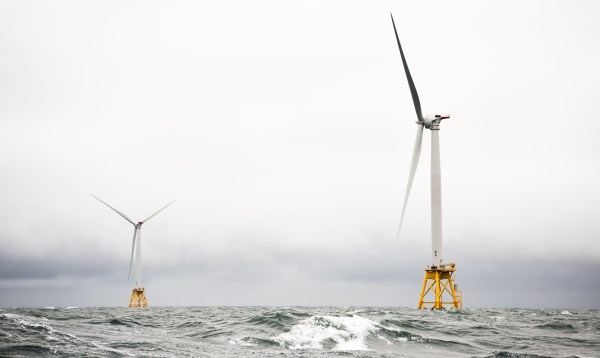Like much of the Northeast, Maine wants to clean up its electricity supply with offshore wind power. It’s planning to build turbines far off the coast, and in May announced a plan to build a port on Sears Island where wind turbines could be assembled and then towed out to sea. The island, connected to nearby Searsport via a causeway, is largely protected from any development, and it’s a popular spot for birding and other outdoor activities.

The proposed site has sparked a uniquely nuanced local debate — less polarized and more personal than the pitched battles playing out over clean energy permitting in other parts of the country. Even some offshore wind supporters and climate advocates are conflicted and say Sears Island isn’t the right spot for a 100-acre wind facility, Annie Ropeik reports for the Energy News Network.
That includes Belfast, Maine, resident Julianne Dow, who thinks the facility is better suited for a nearby oil and logistics terminal known as Mack Point.
“I’m very pro-union, I’m pro-offshore wind and pro having it here, and for the economic benefits for the region,” Dow said at a community listening session about the project. “But I’m also very pro maintaining Sears Island as a precious Midcoast resource.”
Birders, union workers, fishermen, and other coastal Mainers are similarly torn. Read the whole story, which we co-published with Grist and the Maine Monitor, here.
More clean energy news
🚘 Make way for EVs: The White House announces $1.7 billion in Inflation Reduction Act funding will go to 11 car, motorcycle, truck and bus factories to help them reconfigure to make electric vehicles, provided those companies match the federal investment themselves. (E&E News)
📑 Fossil fuels’ 50-year playbook: A think tank’s report documents how the top U.S. gas lobbying groups and two European counterparts have used the same arguments for more than 50 years to promote the continued use of fossil fuels. (OpenSecrets)
📈 What’s raising electricity prices: Rising gas prices, grid infrastructure investments and utility business models that incentivize capital spending are the primary contributors to rising electricity costs, according to a recent report dispelling claims that clean energy is the culprit. (Canary Media)
🔋 Batteries’ toxic side effects: A peer-reviewed study finds lithium ion batteries are full of toxic forever chemicals that have contaminated the areas surrounding manufacturing and disposal sites, spurring the need to find alternative energy storage solutions and ramp up recycling efforts. (The Guardian)
🔌 Virtual reality: A new report finds virtual power plant programs like ones recently launched in California and Texas can shore up power grids against summer demand peaks faster and cheaper than building new generation. (Utility Dive)
⚡ Keys to decarbonization: A new academic paper warns the U.S. won’t be able to decarbonize the grid by 2050 if federal regulators don’t adopt significant grid reforms and implement a national transmission strategy. (Utility Dive)
💧 Cleaning up coal wastewater: Researchers extract rare earth elements and other valuable metals from groundwater flowing from old coal mines, potentially providing materials for clean energy technology while cleaning up poisonous mine drainage. (Associated Press)
🏭 Can a gas plant be stopped? New federal power plant emission rules and shifting economics around the cost of natural gas add uncertainty to Duke Energy’s plans to build a 1,360 MW gas-fired power plant in North Carolina. (Energy News Network)
📢 We want to hear from you! Send us your questions, comments, and story tips by replying to this email.
💸 Support our work: The Energy News Network is powered by support from readers like you. If you like Energy News Weekly, share it with a friend! Or give today and help us keep our news open and accessible for all.
📧 Want more energy news? Sign up for our daily digests.
